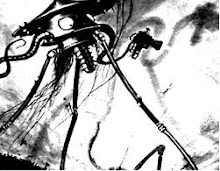Amazon Caves to Copyright Fear Mongers
Last week Author's Guild president Roy Blount Jr. wrote a column for the New York Times arguing that Amazon's Kindle 2 is in violation of copyright law because of the unit's text-to-speech functionality. Blount argued that such functionality was a derivative work -- I won't get into why that is incorrect, since BoingBoing has a nice refutation of Blount's argument.
Today, I read an Associated Press article which reports that Amazon has caved to the Author's Guild:
Amazon.com Inc. changed course Friday and said it would allow copyright holders to decide whether they will permit their works to be read aloud using the second-generation Kindle electronic reader's new text-to-speech feature.The worst part, though, is this:
The Web retailer also said the text-to-speech feature is legal — and wouldn't require Amazon to pay out additional royalties — because a book read aloud doesn't constitute a copy, a derivative work or a performance.If the feature is legal, why cave to the Author's Guild? Allowing the author of a work to disable the functionality of Amazon's Kindle isn't good for users of the product. That would be like VCR manufacturers giving television broadcasters the ability to disable home recording for any particular program. Amazon's move here doesn't make any sense. Giving in to the unreasonable demands of overly-restrictive copyright proponents will only give credence to their arguments. Amazon should take a stand; the fact that Amazon's position is clearly of the right side of the law should have made this an easy decision.
I hope this blows up in the face of the Author's Guild and that e-books which allow the text-to-speech feature sell far beyond those that don't.



1 comment:
I think Amazon is just playing it safe and will reverse their position eventually. I think rather than a legal decision, it was a public opinion decision. Amazon, in my view, doesn't want any bad press and wants nothing but positive word of mouth for the Kindle product at this point. They don't want to be seen as a behemoth (which they are) but as the artist's best friend. They know that early buzz is crucial and that any appearance of not being in tune with the sentiments of artists is not in their perceived self-interest.
Once the Kindle really takes off sales-wise, they'll change. That's my bet.
Post a Comment